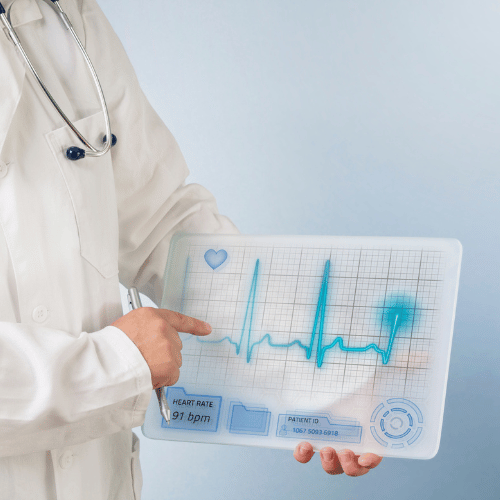
Medical Weight Loss Explained
A lot is said about medical weight loss but we are here to debunk the myths for you.
Cardiology > 24-Hour ECG

Find Out More


A 24-hour ECG is a non-invasive test that records your heart’s electrical activity continuously for a full day.
Unlike a standard ECG, which captures a snapshot of your heart’s rhythm at a single point in time, the 24-hour ECG monitors your heart throughout its daily activities.
This extended monitoring helps detect irregularities or symptoms that might not be present during a brief examination.

You will be given a small, battery-powered device called a Holter monitor to wear in a small pouch around your neck. The monitor attaches to your body with several electrodes on your chest and arms, using a gel to help them stick.
These electrodes are comfortable and should not hurt. You can go about your usual activities during the monitoring period, but you must avoid swimming, bathing, or showering with the device on, and keep it dry at all times.
It is important to note any symptoms you have while wearing the monitor, as this will help us understand the results better. After the monitoring period, return to the clinic to have the device removed.
A cardiologist will then review the results. This test is especially useful for diagnosing intermittent arrhythmias, assessing the effectiveness of medications, and evaluating heart conditions that are not apparent during a routine ECG.
A Holter monitor is typically recommended for individuals who:


We prioritise your safety and privacy throughout the 24-hour ECG process.
All collected data is stored securely and handled with strict confidentiality. The test is completely non-invasive and does not involve radiation or any other harmful procedures.
Additionally, we follow rigorous hygiene practices to ensure the cleanliness of the equipment and protect your health.
We strive to make the 24-hour ECG experience as comfortable as possible:
Use our online booking engine or book your test by giving us a call.
On the online booking engine select the “appointment type” you need.
You will be seen by one of our friendly doctors or trained clinicians.

Wear clean, dry clothing and avoid applying lotions to your chest. Continue with your daily routine, but remember not to bathe or swim while wearing the monitor. Additionally, refrain from consuming caffeine and alcohol for at least 24 hours before the test, as they can affect your heart rhythm.

During a 24-hour ECG test, electrodes are placed on your chest and arms and connected to a portable device that records your heart’s activity as you go about your day. If instructed, keep a diary of your symptoms and return the device to the clinic after 24 hours for evaluation.

Once you return the ECG recorder to the clinic or hospital as instructed, the staff will remove the electrodes and dispose of them properly. If you kept a symptom diary, submit it at this time. This will help the healthcare provider correlate your symptoms with the ECG data. They will then interpret the data and recommend any necessary treatment or further tests.
Incorporated
in 1998
Experienced doctors & a professional team
Registration
not needed
Up-to-date with the latest treatments & testing
Strictly
confidential
Experienced doctors & a professional team
Affordable private
health care
Transparent fee structure with no hidden charges
We work with experienced consultants & healthcare professionals who have received positive feedback from our patients, and with whom we have established long-term relationships.
Latest Episode
Tune in to our podcast to explore the world of healthcare and learn from distinguished special guests. We cover everything from preventative measures to cutting-edge treatments so that you can stay informed and up-to-date on health-related things.

A lot is said about medical weight loss but we are here to debunk the myths for you.

Tourist in London and need a GP? Get fast, private care for illnesses, injuries, or lost medication. No registration needed.

With NHS appointments harder to access, many people are turning to private GPs for faster, more convenient care.
Subscribe for latest updates & news


From same-day private GP and blood test appointments to visa medicals, a sexual and reproductive health clinic, and preventative health screenings, we are here to help.
Contact Us
Accepted Insurance Companies






Please note that Walk-in Clinic is a private medical centre & not an NHS service. Harley Walk-in Clinic Ltd company registration no. 07472804